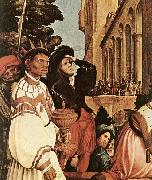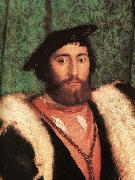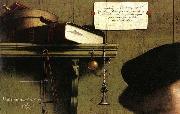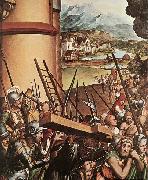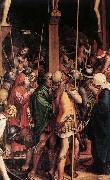HOLBEIN, Hans the Younger Huiler la Reproduction de TableauAll HOLBEIN, Hans the Younger Oil PaintingsGerman painter (b. 1497, Augsburg, d. 1543, London). |
|||

|
|||
|
|
|||
|
||||||||||||
| HOLBEIN, Hans the Younger German painter (b. 1497, Augsburg, d. 1543, London). |
||||||||||||
|
|
||||||||||||
| ID de tableau:: 63713 The Oberried Altarpiece The Oberried Altarpiece 1521-22 Tempera on wood Cathedral, Freiburg The picture shows a detail of the Adoration of the Magi.Artist:HOLBEIN, Hans the Younger Title: The Oberried Altarpiece (detail) Painted in 1501-1550 , German - - painting : religious 1521-22 Tempera on wood Cathedral, Freiburg The picture shows a detail of the Adoration of the Magi.Artist:HOLBEIN, Hans the Younger Title: The Oberried Altarpiece (detail) Painted in 1501-1550 , German - - painting : religious |
||||||||||||
|
|
||||||||||||
| ID de tableau:: 63714 The Ambassadors The Ambassadors 1533 Oil on oak National Gallery, London No preparatory drawings survive for The Ambassadors, nor is it clear how the commission for the work came about. Only the character and employment of the sitters are known. The identification of Jean de Dinteville has been aided through a portrait drawing by Jean Clouet of about the same date as the painting. Though Holbein's style changed little over the course of his career, the subtlety and opulence of the colours in this work are different from the starker tonalities he used in Basle. The green backdrop and the pink slashed shirt of the diplomat add a zest which is further enhanced by the juxtaposition of different textures of silk and woven cloth. Like Titian, Holbein was an assured painter of fur (a crucial ability for a court painter) and the contrast between the soft ermine and the glistening metal chain serves as a rich textural counterbalance. The intense realism Holbein achieved here was due to his prodigious visual memory and refusal to let either draughtsmanship or the application of paint alone dominate the execution.Artist:HOLBEIN, Hans the Younger Title: The Ambassadors (detail) Painted in 1501-1550 , German - - painting : portrait 1533 Oil on oak National Gallery, London No preparatory drawings survive for The Ambassadors, nor is it clear how the commission for the work came about. Only the character and employment of the sitters are known. The identification of Jean de Dinteville has been aided through a portrait drawing by Jean Clouet of about the same date as the painting. Though Holbein's style changed little over the course of his career, the subtlety and opulence of the colours in this work are different from the starker tonalities he used in Basle. The green backdrop and the pink slashed shirt of the diplomat add a zest which is further enhanced by the juxtaposition of different textures of silk and woven cloth. Like Titian, Holbein was an assured painter of fur (a crucial ability for a court painter) and the contrast between the soft ermine and the glistening metal chain serves as a rich textural counterbalance. The intense realism Holbein achieved here was due to his prodigious visual memory and refusal to let either draughtsmanship or the application of paint alone dominate the execution.Artist:HOLBEIN, Hans the Younger Title: The Ambassadors (detail) Painted in 1501-1550 , German - - painting : portrait |
||||||||||||
|
|
||||||||||||
| ID de tableau:: 63716 Portrait of the Merchant Georg Gisze Portrait of the Merchant Georg Gisze 1532 Oil on wood Staatliche Museen, Berlin On the rear wooden wall Holbein paints cartellino, supposedly attached to the wall with sealing wax, with a Latin couplet written on it saying: "Couplet on the portrait of Georg Gisze. What you see here is Georg's portrait showing his features; this is how lively his eye is, this is how his cheeks are shaped. In his 34th year, anno Domini 1532."Artist:HOLBEIN, Hans the Younger Title: Portrait of the Merchant Georg Gisze (detail) Painted in 1501-1550 , German - - painting : portrait 1532 Oil on wood Staatliche Museen, Berlin On the rear wooden wall Holbein paints cartellino, supposedly attached to the wall with sealing wax, with a Latin couplet written on it saying: "Couplet on the portrait of Georg Gisze. What you see here is Georg's portrait showing his features; this is how lively his eye is, this is how his cheeks are shaped. In his 34th year, anno Domini 1532."Artist:HOLBEIN, Hans the Younger Title: Portrait of the Merchant Georg Gisze (detail) Painted in 1501-1550 , German - - painting : portrait |
||||||||||||
|
|
||||||||||||
| ID de tableau:: 63717 The Passion The Passion 1524-25 Oil on limewood, 39 x 31 cm (size of detail) Kunstmuseum, ?ffentliche Kunstsammlung, Basle The picture shows a detail of the scene Via Crucis. The background of the scene opens up as a broad landscape. The perspective effect of distance is achieved by traditional colourist means, with the foreground, centre ground, and background being clearly distinguished in brown, greenish, and blue tones respectively. Continuity is provided by a procession of riders and infantry, whose size diminishes steadily towards the background, taking the eye into the landscape.Artist:HOLBEIN, Hans the Younger Title: The Passion (detail) Painted in 1501-1550 , German - - painting : religious 1524-25 Oil on limewood, 39 x 31 cm (size of detail) Kunstmuseum, ?ffentliche Kunstsammlung, Basle The picture shows a detail of the scene Via Crucis. The background of the scene opens up as a broad landscape. The perspective effect of distance is achieved by traditional colourist means, with the foreground, centre ground, and background being clearly distinguished in brown, greenish, and blue tones respectively. Continuity is provided by a procession of riders and infantry, whose size diminishes steadily towards the background, taking the eye into the landscape.Artist:HOLBEIN, Hans the Younger Title: The Passion (detail) Painted in 1501-1550 , German - - painting : religious |
||||||||||||
|
|
||||||||||||
| ID de tableau:: 63718 The Passion The Passion 1524-25 Oil on limewood Kunstmuseum, ?ffentliche Kunstsammlung, Basle Here the Italianate influences are slightly stronger than in the scene of Christ before Pilate above, though no direct borrowing is observable. Holbein has adapted the smoothly elegant contrapposto stance that Andrea Mantegna had rediscovered in Roman statuary to suggest the nonchalance of the guards, just doing their job. Mantegna's frescoes in the Eremitani chapel at Padua (now damaged) are oblique sources for Holbein's, perhaps through engravings. The parallel placement of limbs, as with the green-cloaked soldier's right leg and the left arm of the guard casting lots, and the antique-style leggings and body-hugging jerkin of the guard in yellow, are southern in design. Otherwise, a sense of northern flurry and activity displaces Mantegna's calm grandeur; the touch of orientalism in the turbaned figure to the right may imply Venetian influence (through artists like Vittore Carpaccio) and contemporary chain-mail, armour and axes underpin the stark emotionalism of the figure of Saint John, with his fists clenched, behind the grieving Virgin; a combination that balances the dourly painful chiaroscuro treatment of the crucified trio overhead.Artist:HOLBEIN, Hans the Younger Title: The Passion (detail) Painted in 1501-1550 , German - - painting : religious 1524-25 Oil on limewood Kunstmuseum, ?ffentliche Kunstsammlung, Basle Here the Italianate influences are slightly stronger than in the scene of Christ before Pilate above, though no direct borrowing is observable. Holbein has adapted the smoothly elegant contrapposto stance that Andrea Mantegna had rediscovered in Roman statuary to suggest the nonchalance of the guards, just doing their job. Mantegna's frescoes in the Eremitani chapel at Padua (now damaged) are oblique sources for Holbein's, perhaps through engravings. The parallel placement of limbs, as with the green-cloaked soldier's right leg and the left arm of the guard casting lots, and the antique-style leggings and body-hugging jerkin of the guard in yellow, are southern in design. Otherwise, a sense of northern flurry and activity displaces Mantegna's calm grandeur; the touch of orientalism in the turbaned figure to the right may imply Venetian influence (through artists like Vittore Carpaccio) and contemporary chain-mail, armour and axes underpin the stark emotionalism of the figure of Saint John, with his fists clenched, behind the grieving Virgin; a combination that balances the dourly painful chiaroscuro treatment of the crucified trio overhead.Artist:HOLBEIN, Hans the Younger Title: The Passion (detail) Painted in 1501-1550 , German - - painting : religious |
||||||||||||
|
|
||||||||||||
| Artiste précédent Artiste prochain | ||||||||||||
|
|
||||||||||||
|
HOLBEIN, Hans the Younger German painter (b. 1497, Augsburg, d. 1543, London). |
||||||||||||
|
|
||||||||||||
|
CONTACTER DES Etats-Unis |





